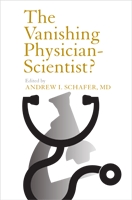Inspiring Scientists

Details
Superlab. Even the name inspires awe. And in a recently published essay, three Haverford professors, including President Stephen G. Emerson '74, argue that this one-of-a-kind laboratory course and the curriculum that supports it are key not only for the College's success but for the future of the American biomedical research field.
For a new book, The Vanishing Physician Scientist?, President Emerson teamed up with Professors of Biology Jenni Punt and Philip Meneely to author a chapter titled“Engaging Undergraduate Students in Research: Sustaining Our Nation's Pipeline of Future Biomedical Investigators."
With mounting undergraduate and medical school debts, insecurity about the availability of research grants, and non-research career options beckoning, physicians may be less drawn to research than they were in earlier decades. The book, edited by Andrew I. Schafer of Weill Cornell Medical College and New York-Presbyterian Hospital, is concerned with the negative effects this trend could have on the field, and presents expert opinions on how to stem the flow of talent away from the lab.
Some chapters suggest ways to coax medical students and those who already have MDs toward careers in research. But the Haverford faculty propose a different approach.“One of our main points is that one cannot simply focus on medical education to address concerns about the training of physician-scientists,” said Punt.“You have to inspire and challenge early in the development of young scientists.”
Punt said that the Haverford trio focused on the College's biology curriculum and its four-quarter Superlab course to describe a model that engages young researchers in a manner“truly unique among small (and large) colleges.” In Superlab, students tackle cutting-edge questions with their own experiments and see first-hand how they can contribute to the field.
“It is not the individual research skills that matter—for example, how to use a particular piece of equipment or how to do a particular research protocol—because those change constantly,” said Meneely. Haverford's science curriculum reinforces more enduring skills like critical thinking and independent problem solving.
President Emerson recalls his own chemistry Superlab as a formative experience.“My lab partners and I synthesized, crystallized, and structurally characterized a Molybdenum-based organic molecule that had never been previously studied,” he said.
Translation for humanities majors:“It was way cool.”
Haverford has long been a powerhouse of physician-scientist training. Per capita, the College is tied with Harvard and Stanford for the number of MD-PhD and DVM-PhD students it trains—the highest ratio in the country. Emerson, himself a product of this pipeline, said that's why Haverford was an obvious choice to highlight in the essay.“This hands on training is important for the future of our society,” Emerson said.“We at Haverford are as inspired by participating in these laboratories as much as we hope are our students, We're successful at it, and of course, we're most familiar with what we do and why.”
--Mara Miller ‘10
Learn more about the book: http://www.cornellpress.cornell.edu/cup_detail.taf?ti_id=5493



